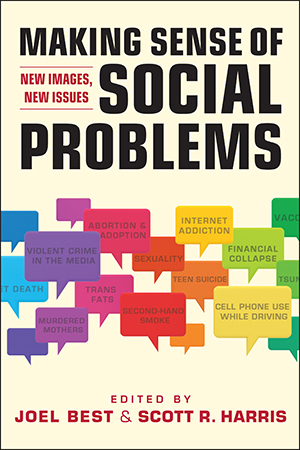
- 2013/335 pages
- Social Problems, Social Constructions
Making Sense of Social Problems:
New Images, New Issues
Hardcover: $75.00
ISBN: 978-1-58826-855-6
Paperback: $28.50
ISBN: 978-1-58826-880-8
Ebook: $28.50
ISBN: 978-1-62637-430-0
Internet addiction. Cell-phone-distracted drivers. Teen suicide. Economic recession. The health risks of trans fats. The carefully selected collection of case studies in Making Sense of Social Problems is designed to help students understand and critically evaluate a wide range of contemporary social issues.
The cases are organized to highlight a series of key elements:
• why "objective" claims deserve critical attention
• how advocates bring attention to issues
• why expert interpretations may change over time
• the role of the media in shaping or distorting concerns
• the consequences of public policy
The introduction, conclusion, and section notes provide a coherent framework for the text. Reflecting the promise of the constructionist approach, the result is a powerful set of tools for systematically investigating social problems. It can be used to advantage as a "stand-alone," as well as with such texts as Joel Best's Social Problems.
The cases are organized to highlight a series of key elements:
• why "objective" claims deserve critical attention
• how advocates bring attention to issues
• why expert interpretations may change over time
• the role of the media in shaping or distorting concerns
• the consequences of public policy
The introduction, conclusion, and section notes provide a coherent framework for the text. Reflecting the promise of the constructionist approach, the result is a powerful set of tools for systematically investigating social problems. It can be used to advantage as a "stand-alone," as well as with such texts as Joel Best's Social Problems.
No rights in South Asia







